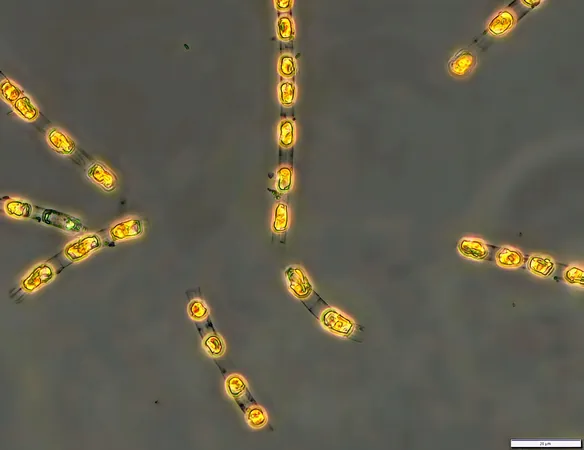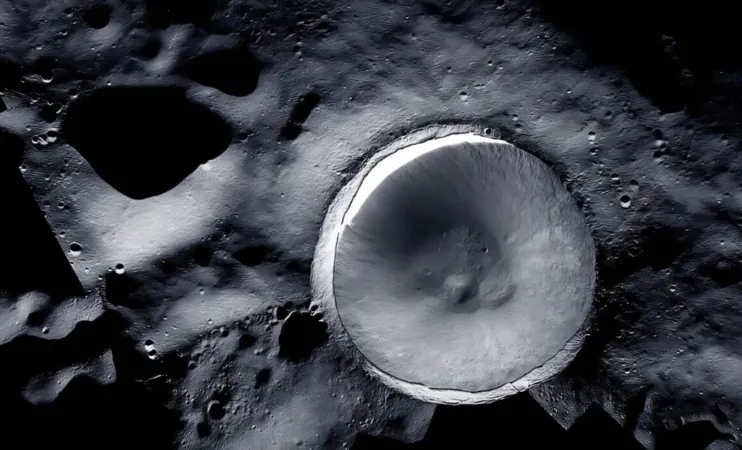
Incredible Discovery: Algae Brought Back to Life After 7,000 Years Under the Baltic Sea!
2025-03-31
Author: Wai
In a groundbreaking scientific achievement, researchers from the Leibniz Institute for Baltic Sea Research Warnemünde (IOW) have successfully revived ancient algae that had been dormant at the bottom of the Baltic Sea for nearly 7,000 years. This remarkable resurrection of life not only offers a glimpse into ancient ecosystems but also presents opportunities to better understand our planet's past and its response to climate change.
A Journey Through Time
Researchers were thrilled at the findings, as these dormant phytoplankton have evolved to survive harsh environmental conditions by entering a resting state. Being encapsulated in sediment has allowed them to endure significant climate shifts over the millennia. "These deposits are like a time capsule containing valuable information about past ecosystems and biological communities," stated Sarah Bolius, a phytoplankton expert and lead author of the study.
The scientific team extracted sediment cores from the Eastern Gotland Deep, which represent various climate phases throughout the Baltic Sea's extensive history. Incredibly, they successfully revived algae from nine different sediment layers, some dating back as far as 6,871 years.
Thriving Algae with Modern Habits
The highlighted species of this study is *Skeletonema marinoi*, a common diatom found in the Baltic Sea, known for flourishing during spring algal blooms. Notably, this species was able to be revived from all tested layers and exhibited not just survival but active growth, division, and photosynthesis akin to its modern counterparts. Surprisingly, the ancient algae maintained robust growth rates, averaging 0.31 cell divisions per day, and produced oxygen levels comparable to present-day strains of *S. marinoi*.
Genetic analyses also revealed distinct evolutionary lineages of the revived algae, highlighting significant genetic changes that have occurred over thousands of years. This offers compelling evidence that these populations remained genetically isolated over extensive periods, further intriguing scientists studying evolution.
Opening Doors to Resurrection Ecology
The research falls under the umbrella of “resurrection ecology,” an innovative approach that enables scientists to reactivate ancient organisms to study their evolutionary processes. Previous efforts had been largely limited to plant seeds and some crustaceans, making the reactivation of *S. marinoi* among the oldest successful revivals from aquatic sediments.
"This breakthrough enables us to conduct 'time-jump experiments' that reconstruct the different stages of the Baltic Sea's evolution," Bolius asserts. This method will allow researchers to examine how species have historically adapted to shifting environmental parameters like temperature, salinity, and oxygen levels, offering comparisons to today’s climate challenges.
Lessons for Climate Change
In an era where climate change is rapidly impacting marine ecosystems, these revived algae provide valuable insight into how species responded to previous warming and cooling trends. The ability to study living cells rather than relying solely on fossil records or degraded DNA opens new avenues for research in evolutionary biology and paleoecology.
Future studies will delve deeper into how these ancient algae respond to changing environmental conditions, contributing to our understanding of genetic resilience and adaptability amid ongoing climate shifts. "The remarkable survival of these diatoms demonstrates not just the adaptability of life, but also the critical importance of sediment cores as repositories of our planet's biological history," concluded Bolius.
As scientists continue to decipher the secrets of these ancient organisms, they are poised to illuminate crucial links between climate, evolution, and the ongoing resilience of life beneath our oceans.
This extraordinary find beckons us to reflect on the potential of ancient organisms and the lessons they may hold for our future in an ever-changing world. Stay tuned for more captivating updates in the realm of climate science and ecology!




 Brasil (PT)
Brasil (PT)
 Canada (EN)
Canada (EN)
 Chile (ES)
Chile (ES)
 Česko (CS)
Česko (CS)
 대한민국 (KO)
대한민국 (KO)
 España (ES)
España (ES)
 France (FR)
France (FR)
 Hong Kong (EN)
Hong Kong (EN)
 Italia (IT)
Italia (IT)
 日本 (JA)
日本 (JA)
 Magyarország (HU)
Magyarország (HU)
 Norge (NO)
Norge (NO)
 Polska (PL)
Polska (PL)
 Schweiz (DE)
Schweiz (DE)
 Singapore (EN)
Singapore (EN)
 Sverige (SV)
Sverige (SV)
 Suomi (FI)
Suomi (FI)
 Türkiye (TR)
Türkiye (TR)
 الإمارات العربية المتحدة (AR)
الإمارات العربية المتحدة (AR)